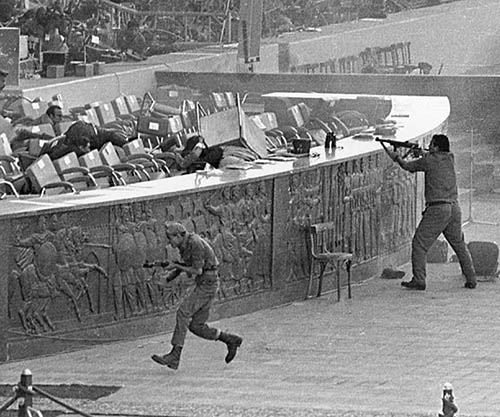1981 The assassination of Anwar Sadat
Since its overthrow of the corrupt King Farouk in 1952, Egypt’s government has struggled with the forces demanding a truly Islamic state. Leaders in this push came largely from the Islamic Brotherhood, a group demanding sharia law and opposed to secular rule and westernization. The military officers involved in the coup at first cooperated with the Brotherhood but soon realized it was incompatible with their view of the future. The new dictator, Colonel Gamal Abdel Nasser, cracked down on the movement, arrested its leadership and executed Sayyid Qutb, the theorist behind Islamic supremacism. The Brotherhood went underground but developed popular support in its mosques and charitable organizations. When Nasser died in 1970 and was succeeded by Anwar Sadat, most oppressive measures against it were lifted, its members were released from prison and the influence of the Brotherhood and Islamicization grew grew.
When Sadat signed a peace treaty with Israel and shared the Noble Prize with Israeli prime minister Menachem Begin, Islamic discontent in Egypt grew. Groups more radical than the Brotherhood such al-Jihad and Gama’a Islamiyya began to plan violent action against the ruling regime. On October 6, 1981 in the midst of a military parade to celebrate the crossing of the Suez Canal in the 1973 war with Israel, a truck full of troops stopped in front of the reviewing stand and attacked the dignitaries with grendades and submachine guns. President Sadat and ten others were killed.
One of the assassins was shot on the spot and three others were put on trial and executed. Sadat’s assassin proudly proclaimed “I have killed Pharoah! I am not afraid to die.” Though this plot failed to spark a Muslim uprising, the ideology that hopes to overthrow all existing Arab governments and replace them with a Sunni Islamic state remains strong.
